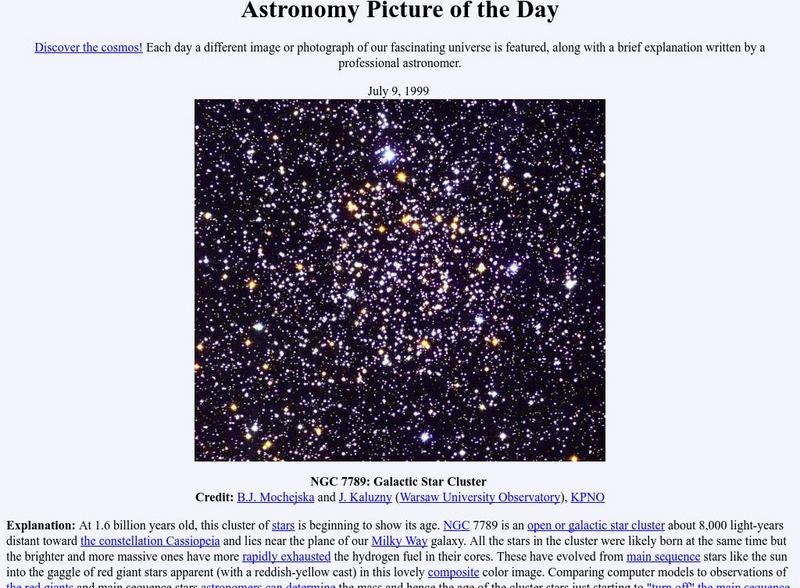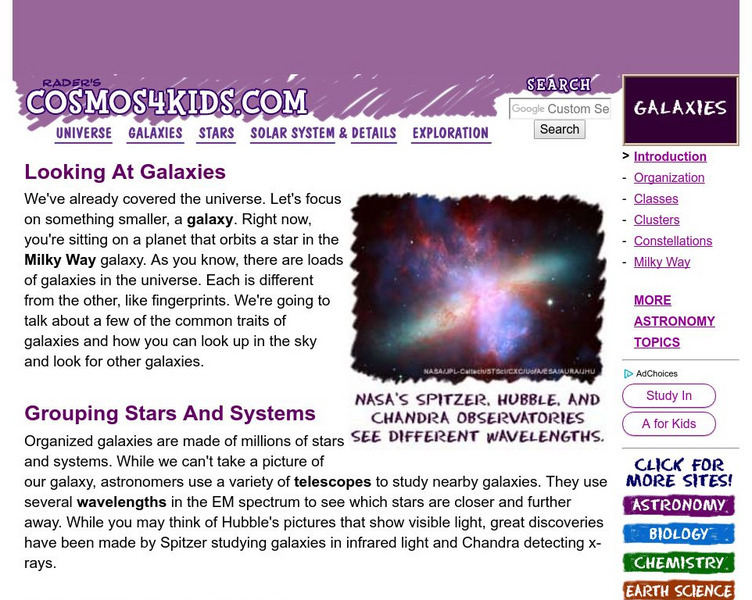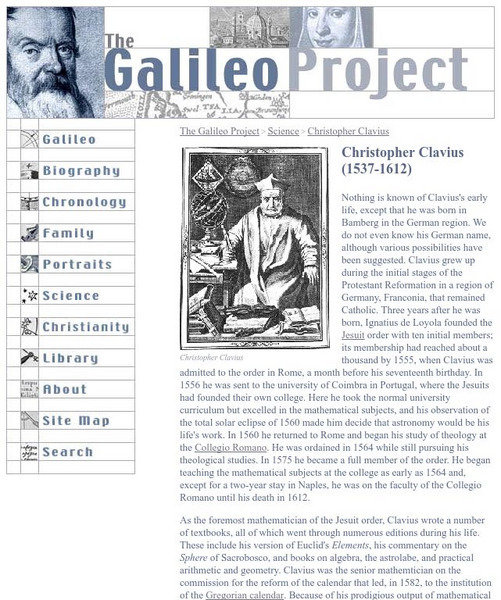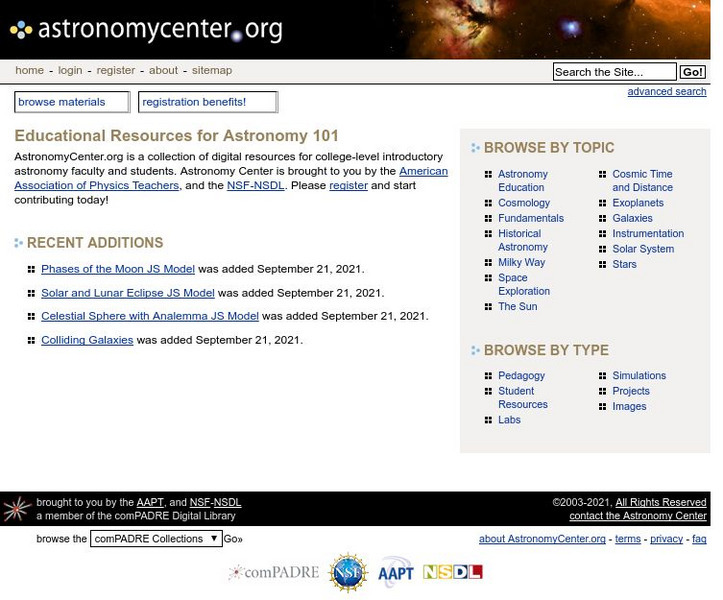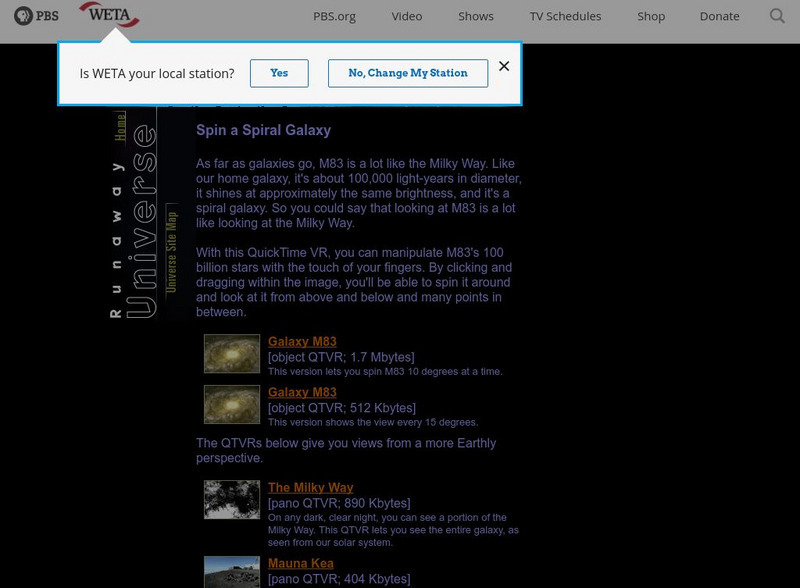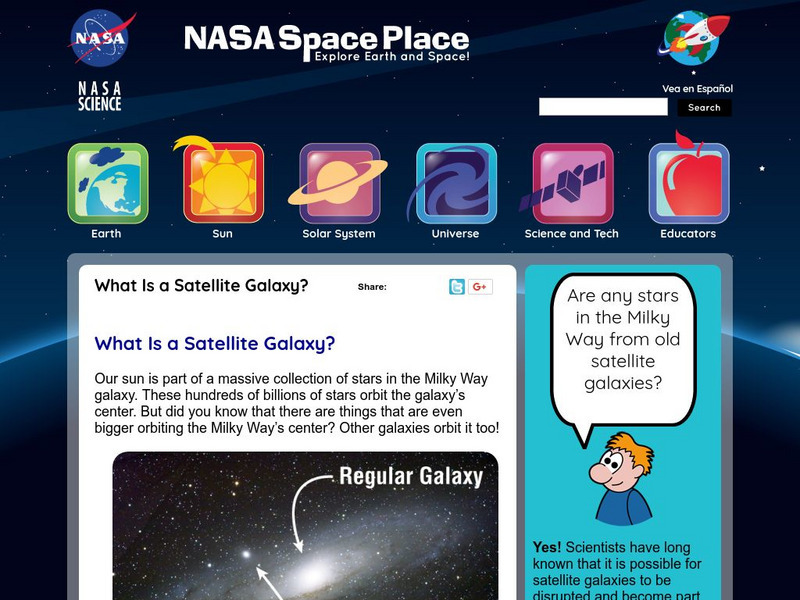Exploratorium
Exploratorium: Your Age on Other Worlds
Enter your birthday and find out how old you are on the other planets in the Milky Way Galaxy. Understand why our age is different on each planet.
NASA
Nasa: Astronomy Picture of the Day: Giant Stars
Image of a group of red giant stars are seen in an image from the edge of the plane of the Milky Way. The evolution of these stars is explained. Many embedded links contained in the text to related topics.
NASA
Nasa Science: For Kids: Solar System Fun
Test your knowledge about the solar system with games and activities designed to help explore what you know about the sun, the planets and their moons, space rocks, the Milky Way, and related topics.
National Gallery of Art
National Gallery of Art: The Fall of Phaeton
Young scholars will be introduced to the Greco-Roman myth of Phaeton and how he created the Milky Way galaxy by critically analyzing The Fall of Phaeton by Rubens. They will then create their own constellation to be displayed in a...
Polk Brothers Foundation Center for Urban Education at DePaul University
De Paul University: Center for Urban Education: Learning About the Solar System [Pdf]
"Learning about the Solar System" is a one page, nonfiction, reading passage about scientists and learning about our solar system and how it works. It is followed by constructed-response questions which require students to provide...
Other
Joseph Bruchac Home Page: Joseph Bruchac
This site is Joseph Bruchac's homepage. It provides links to his biography, a listing of his major works, and other online resources for the author. It also provides links to several of his poems to open or download on mp3.
Cosmos 4 kids
Cosmos4 Kids: Galaxies
Learn the basic facts about galaxies. Brief, to the point text make this site most appropriate for younger students.
Rice University
Galileo Project: Christopher Clavius
This site from The Galileo Project of the Rice University provides a biography of Clavius including an excerpt from his writings. A picture is provided in this article along with links to additional information.
Ministerio de Educación (Spain)
Ministerio De Educacion: Nuestra Galaxia, Llamada via Lactea Mod Vii Unit 1
Learn about our galaxy, their mass and the evolution of the various theories about their conception.
Wikimedia
Wikipedia: Democritus
This encyclopedia entry surveys the life and thought of the 5th century BCE Greek philosopher Democritus, who proposed the existence of the atom.
Kidport
Kidport: Space Science
This complete resource will help students to improve their understand of space exploration. Includes images of the universe, galaxies, stars and planets.
National Institute of Educational Technologies and Teacher Training (Spain)
Ministerio De Educacion: La Situacion De La Tierra en El Universo
Throughout this unit you will make an imaginary journey that will transport you from the remotest infinity of the universe around us, to the surface of our planet. During this trip you will see the main features and components of our...
National Institute of Educational Technologies and Teacher Training (Spain)
Ministerio De Educacion: El Universo, La via Lactea Y El Sistema Solar
Ministerio de Educacion: El Universo, la Via Lactea y el Sistema Solar.
Wikimedia
Wikipedia: The Black Hole
This site examines the black hole as an object in astrophysics. Delve into this comprehensive resource that covers this concept from its history, to qualitative physics, the reality of black holes, mathematical physics and more.
American Museum of Natural History
American Museum of Natural History: O Logy: Stuff to Do: Stargazing
Get started on the road to becoming an expert stargazer by following these recommendations for identifying stars, planets, and constellations. Includes an example of a journal that can be used as a record of your investigations.
American Association of Physics Teachers
Com Padre Digital Library: The Astronomy Center
A searchable collection of "curriculum materials, images, classroom demonstration, learning resources, evaluation instrumnets, and articles about approaches to astronomy education". Users can contribute materials by creating a free account.
PBS
Pbs: Nova Online: Galaxies, Clusters, and Superclusters
PBS site explores these building blocks of the universe as well as their various types and clusters.
PBS
Pbs Nova Online: Spin a Spiral Galaxy
PBS site provides various views of spiral galaxies. (Quick Time required) With this technology, you can manipulate the image to spin it around and look at it from various angles.
Other
University of Cambridge: Astro Adventure
Imagine a time when you can travel through space, planet to planet, cheaply and in comfort, when you can take a trip to the stars as your next holiday. Well, imagine no more. Learn more about the solar system as you take this trip of a...
Other
Sky Server: About Astronomy
This site from SkyServer provides the history of astronomy as well as links to mapping the sky, galaxies, cosmic structures and much more. Several pictures are given, and the article is medium in length.
Scholastic
Scholastic: Study Jams! Science: Our Solar System: The Universe
A video and a short multiple-choice quiz on the Universe and what it is made up of.
NASA
Nasa: Space Place: What Is a Satellite Galaxy?
Find out about the behavior and characteristics of the many satellite galaxies that orbit other galaxies.
Space Telescope Science Institute
Amazing Space: Galaxies
What is a galaxy? What is the name of our galaxy? Site offers answers to these questions as well as many more.



